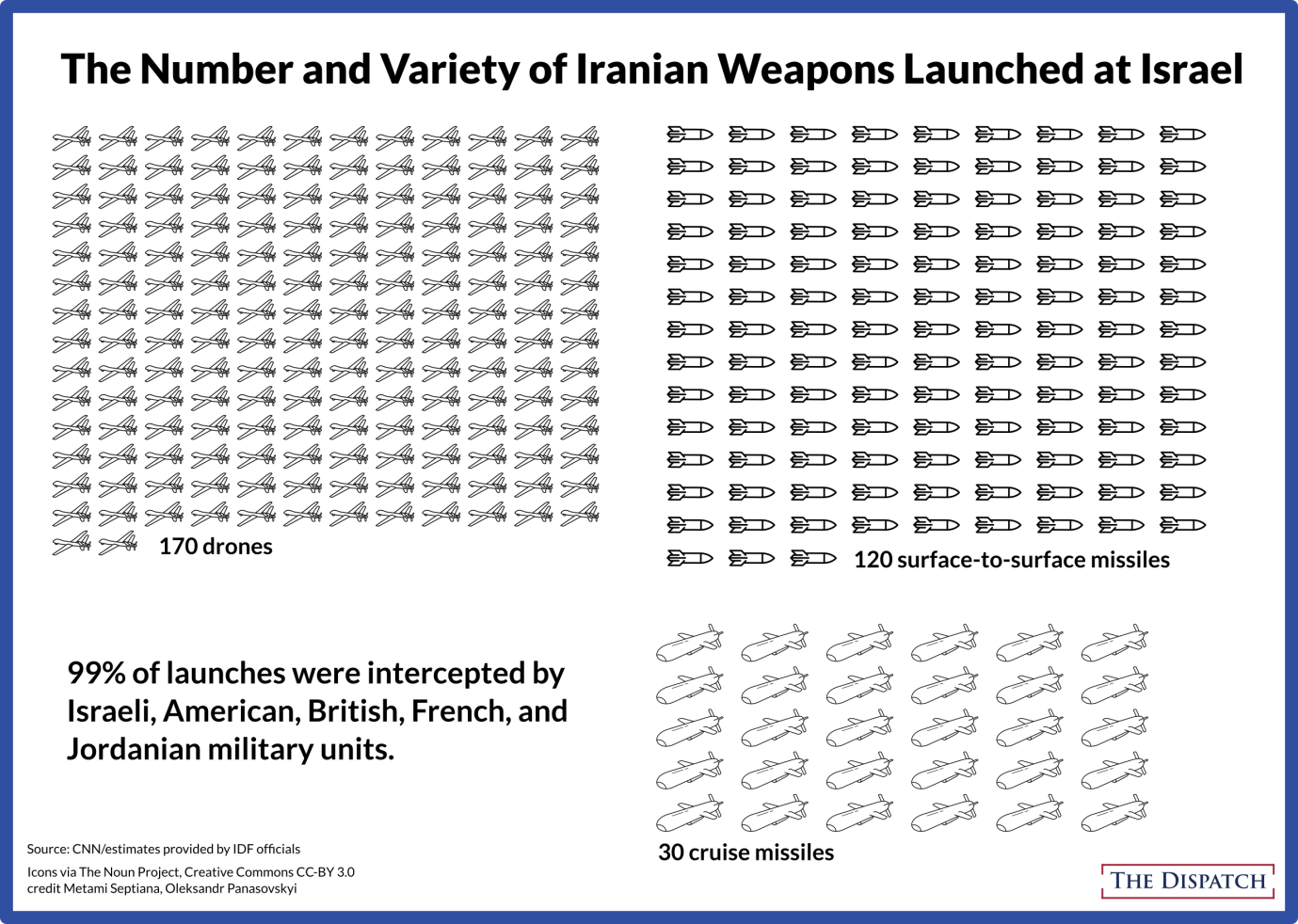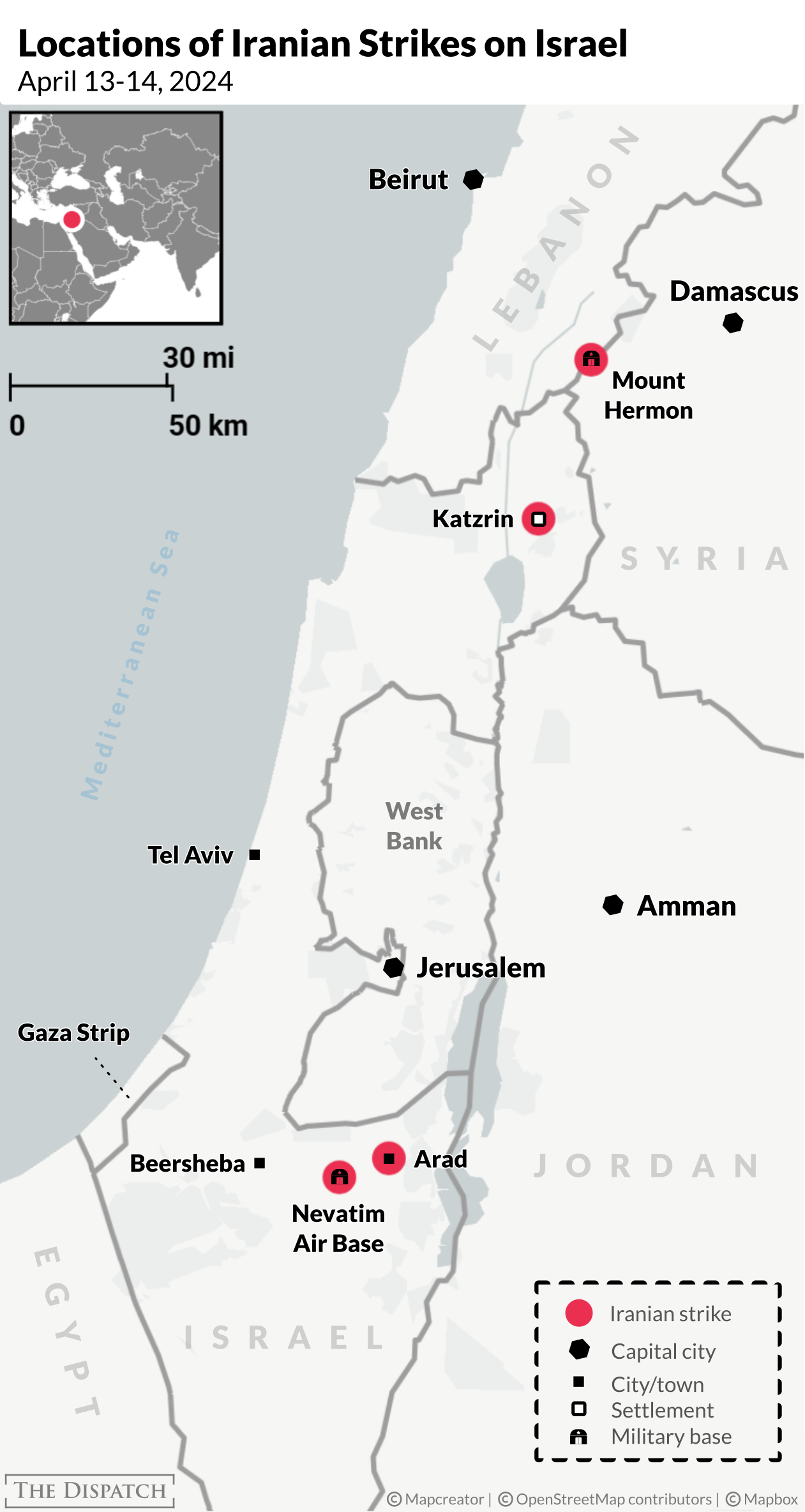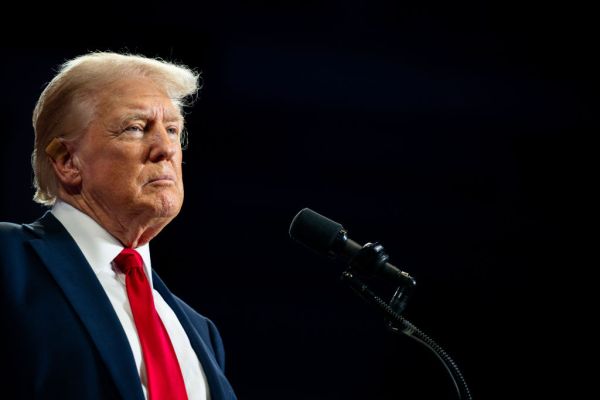Happy Monday. It’s Tax Day, and if this is the first you’re hearing of it, well, Godspeed—and we know what your evening plans look like.
Quick Hits: Today’s Top Stories
- Iran launched its first-ever direct attack against Israel late Saturday night and early Sunday morning, firing 350 missiles and armed drones in the direction of Israeli territory. The Israeli military—with support from the U.S. military and those of Jordan, the United Kingdom, and France—shot down 99 percent of the incoming projectiles before they reached their targets, according to Israel Defense Forces spokesman Rear Adm. Daniel Hagari. Only one serious injury was reported, from falling shrapnel after the interception of an Iranian missile. Following the attack, President Joe Biden reportedly warned Israeli Prime Minister Benjamin Netanyahu the U.S. would not support an Israeli counterattack against Iran. Meanwhile, Republican House Speaker Mike Johnson signaled on Sunday the chamber would vote on aid to Israel in the coming days—though it was unclear whether the vote would be on the funding that already passed the Senate and includes aid to Ukraine or a separate package that the upper chamber would also have to pass. Prior to Tehran’s attack on Israel on Saturday, the Iranian Revolutionary Guard Corps (IRGC) seized a container ship in the Strait of Hormuz, taking the crew of the Portuguese-flagged ship hostage.
- The chief of Ukraine’s armed forces, Oleksandr Syrskyi, warned on Saturday that the war’s eastern front has “deteriorated significantly in recent days,” owing to increased offensive activity by Russian forces. After months of sustained Russian missile attacks targeting Ukrainian cities and electricity infrastructure, German Chancellor Olaf Scholz said Friday his country would send Ukraine an additional Patriot missile system and ammunition as U.S. aid remains stalled in Congress. Meanwhile, the Wall Street Journal reported Friday that Russian President Vladimir Putin told the United Nations’ nuclear watchdog that he intends to restart the Russian-occupied Zaporizhzhia nuclear power plant, Europe’s largest. Several drones hit the currently powered-down site—on a front line in southeastern Ukraine—as recently as last week.
- New York Judge Juan Merchan—who is overseeing former President Donald Trump’s hush money criminal trial—on Friday rejected one of Trump’s final efforts to delay the proceedings set to begin later today. Trump and his team asked for the trial to be pushed “indefinitely” on the grounds that the media attention surrounding it would make it impossible for Trump to receive a fair trial. Merchan, however, held that Trump intentionally generates much of the media attention. “The situation Defendant finds himself in now is not new to him and at least in part, of his own doing,” the judge wrote.
- The House voted 273 to 147 on Friday to pass a bill reauthorizing Section 702 of the Foreign Intelligence Surveillance Authority (FISA) for two years instead of the originally proposed five-year renewal. Both parties’ conferences were split on the measure, with 88 Republicans and 59 Democrats voting against it. An amendment to the bill that would have required the government to obtain a warrant before searching Americans’ data swept up in foreign surveillance failed to pass after receiving 212 votes in favor and 212 against. The ultimate passage comes after an effort to open debate on the reauthorization failed on Wednesday after Trump voiced his opposition to the measure. Meanwhile, House Speaker Mike Johnson on Friday promised to introduce an “election integrity” bill while visiting Trump at Mar-a-Lago that, among other provisions, would require proof of U.S. citizenship to vote.
- Trump endorsed Dave McCormick on Saturday in his race to unseat Democratic Sen. Bob Casey in Pennsylvania. McCormick is running unopposed for the Republican nomination, but two years ago, when McCormick was facing off against TV doctor Mehmet Oz, Trump labeled McCormick “the candidate of special interests and globalists and the Washington establishment.” McCormick—for whom former President George W. Bush recently hosted a fundraiser in Dallas, Texas—has endorsed Trump for president.
- In the latest New York Times/Siena College national poll released Saturday, President Biden had narrowed Trump’s lead compared to the last such survey, bringing the two candidates to a virtual tie at 46 percent to 45 percent. The survey, which was in the field from April 7 to April 11, suggests Biden’s uptick may come from traditional Democratic voters “coming home,” with the president winning a larger share of that group than he did in the same poll a month ago.
A Telegraphed Iranian Attack

TEL AVIV, Israel—A Saturday evening alive with protests calling for the safe return of Israeli hostages held by Hamas in Gaza fell abruptly silent here in Israel’s second-largest city as disturbing news began to trickle in. Iran, the Israeli military later confirmed around 11 p.m., had begun its long-awaited—and first-ever–direct attack on the state of Israel.
By early Sunday, the Islamic Republic had launched some 170 explosive drones, 120 ballistic missiles, and 30 cruise missiles westward toward Israel. Israel’s air force, together with an international coalition, intercepted a large percentage of the projectiles before they ever crossed into Israeli airspace. Nearly all of those that did reach the country were intercepted by its layered air defense system before hitting their targets, with the exception of a small number of ballistic missiles, which struck the Nevatim Airbase and caused minor damage. Shrapnel from an intercepted missile fell on a Bedouin village in the Negev Desert, severely injuring a 7-year-old girl.

The unprecedented attack followed weeks of warnings by U.S. and Israeli officials, who had assessed that Iran planned to retaliate against Israel following the latter’s alleged strike in Damascus, Syria, earlier this month that killed Iranian Gen. Mohammad Reza Zahedi and several other members of the Islamic Revolutionary Guards Corps (IRGC). During a press conference Friday, President Joe Biden reiterated his monosyllabic message to Iran and its proxies in the region: “Don’t.”
The warning fell on deaf ears as Iran went forward with an attack from its own territory one day later—a first in its many years of proxy warfare against Israel. Before the projectiles even reached Israel, however, Iran’s mission to the United Nations released a statement citing the Damascus strike as Tehran’s reason for attacking and stating: “The matter can be deemed concluded.”

Israel, for its part, seems to disagree. After a meeting of the Israeli War Cabinet on Sunday to discuss possible counterattack options, a leading member of the cabinet, Benny Gantz, vowed that “this event is not over,” adding that Iran will pay a price “in a manner and time that is correct for us.” But what form an Israeli response might take remains unclear.
Jonathan Schanzer, senior vice president for research at the Foundation for Defense of Democracies, told TMD that Israel could target like-for-like by hitting IRGC facilities. Cyberattacks or covert strikes—of the type that killed Zahedi in Damascus—may also be on the table. “And then there’s of course the big question, which is does this open the door for the Israelis to look at nuclear sites that they’ve been wanting to strike for the last 10 or 15 years, but perhaps felt that their hands were tied because they were only taking fire from proxies, and not Iran itself?” Schanzer said. “Some might say that this now opens the door for Israel to hit what it wants.”
“For years, the Israelis have been talking about [the] so-called octopus strategy, where they have said that it’s not sufficient to fight with the tentacles of the octopus but that they need to strike at the head of the octopus,” Schanzer continued. “Well, the octopus head has just emerged.”

But the White House, despite reportedly warning Iran last week that a direct attack could bring about a joint U.S.-Israel response, seems to be erring on the side of restraint. Biden reportedly informed Israeli Prime Minister Benjamin Netanyahu on a call Saturday that the U.S. wouldn’t support an Israeli counterattack against Iran as his administration tries to avert a broader regional war. “You got a win. Take the win,” Biden said in reference to the joint defensive efforts that helped Israel thwart the bombardment, according to Axios.
That win could be short lived, Schanzer argued, if Israel doesn’t retaliate. “If Iran is not punished for this, if Iran is not forced to pay a price in some significant way, then it’s a foregone conclusion that they will strike again,” Schanzer told TMD. “And I think that’s what the Israelis are wrestling with in their discussions with the Biden administration. Biden is trying to keep a lid, the Israelis are trying to establish deterrence—can they find a way of doing both?”
But in the immediate, the attack showed the strength of both Israel’s own air defenses and its strategic partnerships throughout the region. The U.S., United Kingdom, and France were among the Western countries involved in shooting down Iranian projectiles before they reached Israeli soil. Arab States, reportedly including Jordan and Saudi Arabia, also played an important role in Israel’s defense. “Israel, the United States, the United Kingdom, and France participated in the interceptions,” Maj. Nir Dinar, an IDF spokesman, told TMD, “and there have been a few other countries in the region, which are not Western countries, that participated.”
After weeks of increasingly public rifts between the U.S. and Israel over the war in Gaza, this joint defensive effort may have come as a surprise to Iran. “What it did with a single stroke, at least for a moment, was end Israel’s isolation,” Jonathan Spyer, the director of research at the Middle East Forum, told TMD from Jerusalem. “If Iran was banking on Israel’s isolation, then it may well have been disappointed.”
When former President Donald Trump was hit with his first of four criminal indictments last March, he joined former President Ulysses S. Grant as the only other president to have officially run afoul of the law. In 1872, Grant was arrested while in office for speeding through Washington, D.C., in a horse-drawn carriage. After his arrest, Grant posted $20 in collateral—which he forfeited after not showing up for his court date—and that was that.
But this morning at 9:30 a.m., Trump will venture out on his own as the only current or former U.S. president to stand trial. And instead of just $20 in lost collateral, he faces felony charges that could carry prison time.
Trump’s criminal trial over alleged hush money payments made to adult film star Stephanie Clifford—also known as Stormy Daniels—ahead of the 2016 election campaign begins today. The case, brought by Manhattan District Attorney Alvin Bragg, includes 34 felony counts that focus on allegedly falsified business records related to the $130,000 that now-former Trump attorney Michael Cohen paid Daniels. Trump’s associates reportedly made the payments to buy her silence—during a presidential campaign—about a sexual encounter she had with Trump years earlier.
Cohen claims that the Trump Organization reimbursed him for the Daniels money in a series of payments but that the organization falsely recorded the reimbursements as a legal retainer. Bragg will argue that the alleged falsifying of business records—a misdemeanor offense—was designed to hide a campaign finance crime, parlaying the charges into felonies. While there are those who believe Bragg is on solid footing, a number of legal analysts argue this bank shot makes Bragg’s case the weakest of the four criminal indictments against Trump. As Sarah explained last March:
This case will require that Manhattan District Attorney Alvin Bragg prove that Donald Trump violated a New York law on the falsification of business records for the purpose of committing a federal campaign finance violation that the federal government declined to prosecute. Again, we don’t need to get into the legal weeds here, but 1) it’s not even clear a state prosecutor can use a federal crime to bootstrap a state misdemeanor into a felony, 2) it’s unclear the facts underlying the federal crime even as alleged by the prosecution would, in fact, be a federal crime, and 3) his own office declined to prosecute this case under his predecessor because the legal grounds were so shaky.
Trump’s lawyers have relied on what one might call the “throwing-spaghetti-at-the-wall” approach in recent months to delay or forestall a trial. His legal team has attempted to get the case dismissed, moved to federal court, or moved to a different jurisdiction within the state. After those efforts failed to stop a trial from moving forward, Trump tried a series of last-ditch appeals to delay the trial date which met the same fate. In one recent instance, Trump’s lawyers requested the proceedings be adjourned due to “exceptionally prejudicial pretrial publicity.” New York Supreme Court Justice Juan Merchan, who’s overseeing the case, denied the request, citing the former president’s behavior during his other recent trials. “He was personally responsible for generating much, if not most, of the surrounding publicity with his public statements, which were often made just a few steps outside the courtroom,” Merchan wrote.
Today’s hearing involves the start of a more mundane but nonetheless crucial proceeding: jury selection. The defense and prosecution will question New Yorkers as part of the process to seat a 12-person, fair, and impartial jury—a task complicated by the defendant being one of the most famous people on the planet about whom the public has plenty of preexisting opinions.
Merchan outlined the rules for jury selection, including the questions both sides could ask potential jurors, which highlight the challenge of adjudicating the conduct of such a high-profile figure. The prosecution and the defense will both be trying to select individuals sympathetic to their positions through questions like, “Have you ever attended a rally or campaign event for Donald Trump?” or, “Have you ever attended a rally or campaign event for any anti-Trump group or organization?” Merchan’s rules do limit the scope of political inquiry, however, barring questions about voting history, party registration, and political contributions. Each side will have the opportunity to unilaterally remove a set number of jurors and also make a case to the judge as to why other jurors could not be fair and impartial.
The high-stakes jury selection could take a week or longer—other criminal cases with famous defendants have taken months to set a jury. Both sides seem to understand how much rides on the make-up of a panel selected from deep blue Manhattan to hear the case of the GOP’s presumptive presidential nominee, with Trump himself trying to portray the trial as a sham because of the locale. “VERY UNFAIR VENUE, WITH SOME AREAS THAT VOTED 1% REPUBLICAN,” he wrote on Truth Social earlier this month. “THIS CASE SHOULD BE MOVED TO NEARBY STATEN ISLAND.” Trump carried 57 percent of Staten Island’s vote in the 2020 presidential election. Trump’s legal team may be angling to seat a juror who feels passionately enough about the former president to stop a guilty verdict, which requires a unanimous decision in New York state.
Most of the courtroom drama is likely to play out once witnesses actually take the stand. Michael Cohen and Stormy Daniels have said publicly that they’re prepared to testify at trial, and Hope Hicks, Trump’s campaign secretary at the time of the alleged conduct, is another potential witness. Trump suggested on Friday that he could take the stand himself. “Yeah, I would testify, absolutely,” he said during a press conference at Mar-a-Lago on Friday with House Speaker Mike Johnson.
The entire trial is expected to last six to eight weeks, and Trump is required to attend the proceedings: four days a week—every day except Wednesdays—for the duration of the trial. That’s a lot of time off the campaign trail, but Trump will no doubt continue his practice of turning his legal proceedings into campaign events of their own. “Rabid Democrats will raise MILLIONS while I’m stuck defending myself in court,” he said in a fundraising email last week. Another email sent on Friday warned, “72 HOURS UNTIL ALL HELL BREAKS LOOSE!” Lower Manhattan will witness an even more extended media and protester circus than during Trump’s arraignment last spring. Steve Bannon, for example, plans to record episodes of his podcast, “War Room,” outside of the courthouse.
It remains to be seen whether the proceedings will harm or help Trump’s campaign. On the one hand, Trump’s standings rose against his GOP primary challengers following the indictments last spring, helping him clinch the nomination. The New York case—which is on the shakiest legal footing—could very well be the only case to go to trial before the election, potentially helping Trump make a case that all of his various legal woes are part of a partisan scam.
On the other hand, the trial will shine a spotlight on Trump’s sordid behavior with a porn star and could potentially lead to a felony conviction. If he’s found guilty, New York law doesn’t require a minimum sentence; the maximum is four years for each of the 34 counts. Judge Merchan could simply give Trump probation if he so chose. But, a conviction could hurt Trump with independent voters or those who haven’t followed his legal travails closely. Or, it could have no effect at all.
In any case, we’ll be sure to enjoy the next two months of what we have no doubt will be substantive and appropriate trial coverage.
Worth Your Time
- For the Atlantic, Eliot A. Cohen asks: “Why has Iran begun to act more blatantly, less cautiously, and at greater ranges than ever before?” His answer: “One answer may be the seemingly irrevocable march of that country to the possession of nuclear weapons, a march that was briefly slowed by the American invasion of Iraq in 2003 (which was followed by a pause in the Iranian program) and the ill-fated and time-limited Joint Comprehensive Plan of Action (JCPOA) negotiated in 2015, abandoned by the Trump administration and unsuccessfully attempted to be revived by the Biden administration. Iran now plays an important role in Russia’s war in Ukraine. Iranian drones fly every night at Ukrainian cities, revealing and stressing Ukrainian air defenses to pave the way for Russian cruise and ballistic missiles. Iran has reportedly helped with the construction of Russian factories to manufacture the drones, presumably in exchange for Russian assistance on other fronts. It is this bigger geopolitical shift that makes the Iranian attack on Israel so significant. The major players in the Russia–China–Iran–North Korea coalition are increasingly willing to use open violence (against Ukraine, Israel, and the Philippines), and to threaten much worse, including the use of nuclear weapons. They are united by a growing belief that their moment is coming, when a divided and indecisive West, richer but flabbier, will not fight.”
Presented Without Comment
Politico EU: Downing Street Was ‘Infested With Fleas,’ [Former U.K. Prime Minister] Liz Truss Says in New Memoir
Also Presented Without Comment
New York Times: [GOP New Hampshire Gov. Chris] Sununu Says Trump ‘Contributed’ to Insurrection, but Still Has His Support
Toeing the Company Line
- In the newsletters: The Dispatch Politics crew checked in on Republican Senate candidate Mike Rogers’ evolving abortion position in Michigan, Jonah argued the meaning of art is in the eye of the beholder, Nick suggested that vibes may ultimately decide the 2024 election, and Chris looked at some numbers (🔒) surrounding the abortion policy debate.
- On the podcasts: Jonah ruminated on Top Chef and Barack Obama’s messianic reputation on The Remnant, and Jamie is joined on The Dispatch Podcast today by New York Times opinion columnist Carlos Lozada to discuss how to read political memoirs.
- On the site over the weekend: Stephanie H. Murray reviewed Jonathan Haidt’s new book, The Anxious Generation, and Sean Keeley argued that Netflix’s 3 Body Problem is a “dud” but can still teach us something.
- On the site today: Reilly Stephens dives into the recent back-and-forth over so-called “squatters’ rights.”
Let Us Know
Should Israel launch a counterattack against Iran? If so, what should it look like?










Please note that we at The Dispatch hold ourselves, our work, and our commenters to a higher standard than other places on the internet. We welcome comments that foster genuine debate or discussion—including comments critical of us or our work—but responses that include ad hominem attacks on fellow Dispatch members or are intended to stoke fear and anger may be moderated.